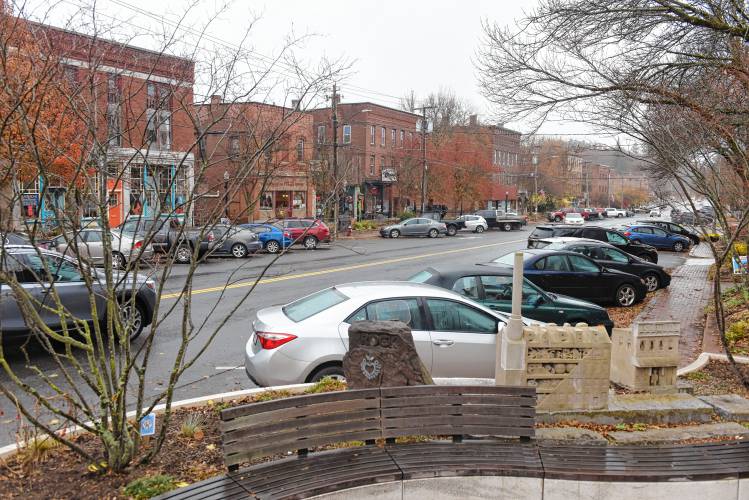Montague chosen for public art training program

Avenue A in Turners Falls, with a public art installation by Tim de Christopher pictured in the foreground. Staff File Photo/Paul Franz
| Published: 02-13-2024 9:42 AM |
MONTAGUE — With Montague’s inclusion in the 2024 “Making It Public” art program, town officials are learning how to increase the town’s capacity to support and promote public art making.
Through the program, offered by the New England Foundation for the Arts (NEFA) in cooperation with the Metropolitan Area Planning Council’s (MAPC) Arts & Culture Department, officials with Montague’s Parks and Recreation Department, Montague Public Libraries and RiverCulture are taking part in five virtual training courses that started Jan. 23 and will continue through April 2. At the end of the training sessions, Montague will use a $15,000 grant to put out a call for temporary public art.
“NEFA and MAPC want to train municipalities to incorporate public art in ways that are more meaningful to their communities,” said Suzanne LoManto, director of RiverCulture, an organization that seeks to foster Montague’s creative economy.
In addition to Montague, the other Massachusetts communities chosen to participate in “Making It Public” are Belchertown, Chelmsford, Clinton, Everett, Peabody, Somerville and Southbridge. The curriculum trains municipalities to commission public art that, according to the NEFA website, aligns “the principles of fairness, transparency and accountability in public procurement.”
Though the art projects are temporary, the knowledge gained from the program will endure. LoManto, who has participated in two training sessions so far, feels that the training has been invaluable not just for Montague, but for all the communities participating in “Making It Public.”
“What I like most about it is that it incorporates up to three people in each municipality who can take this training,” LoManto said, with Parks and Recreation Director Jon Dobosz and Library Director Caitlin Kelley being Montague’s other two participants. “It’s really important because ... how municipalities are strong and how they function is when there’s institutional knowledge inside a town hall.”
LoManto added that the skills gained from the program don’t just help Montague now, but will help carry the community into the future.
“If I were to leave my position, that knowledge stays with my colleagues,” she said, “and they teach this process to the person who would take my position and then if somebody else leaves it goes on.”
Article continues after...
Yesterday's Most Read Articles
 Charlemont planners approve special permit for Hinata Mountainside Resort
Charlemont planners approve special permit for Hinata Mountainside Resort
 $338K fraud drains town coffers in Orange
$338K fraud drains town coffers in Orange
 Greenfield residents allege sound and odor issues from candle, cannabis businesses
Greenfield residents allege sound and odor issues from candle, cannabis businesses
 Fire at Rainbow Motel in Whately leaves 17 without a home
Fire at Rainbow Motel in Whately leaves 17 without a home
 Hotfire Bar and Grill to open Memorial Day weekend in Shelburne Falls
Hotfire Bar and Grill to open Memorial Day weekend in Shelburne Falls
 Mohawk Trail’s Chay Mojallali sets school record in high jump as Franklin County contingent racks up titles at Western Mass. Division 2 Track & Field Championships (PHOTOS)
Mohawk Trail’s Chay Mojallali sets school record in high jump as Franklin County contingent racks up titles at Western Mass. Division 2 Track & Field Championships (PHOTOS)
There is a broad range of possibilities for what the temporary art, to be in place for up to 18 months, could be.
“It could be a sculpture that, over 18 months, it is intentionally meant to fall apart and dissolve,” LoManto elaborated. “It could be something just related to projection and it’s just [up for] one evening.”
LoManto anticipates the community might see the art in about a year following a request for proposals (RFP) period and public engagement.
When asked about recruiting artists for the project, LoManto said she is pleased with the foundation “Making It Public” is providing her. While a temporary art project serves as the most immediate result, the knowledge that town officials gain from the program is intended to help Montague reach out to the community and local artists to work together to create lasting art that represents the town.
“After this training, personally, I’m going to feel more confident in public engagement knowing that I haven’t skipped steps or I haven’t forgotten anyone,” she said.
LoManto has high hopes for the project.
“The trainings are kind of twofold. One is how to manage a call for public art, so that means through community engagement, writing the request for proposals, scoring those applications, reviewing the applications in a fair way and then working with the artists for the installation. The other side is ... a community engagement component, which is how do you get meaningful art, public art that is meaningful for that community. How do you get that there?” LoManto said. “I hope that this work of art is really meaningful to people in the town of Montague.”

 PHOTOS: 22 years of sharing wellness resources in Greenfield
PHOTOS: 22 years of sharing wellness resources in Greenfield Regional listening session to inform development of statewide housing plan
Regional listening session to inform development of statewide housing plan
